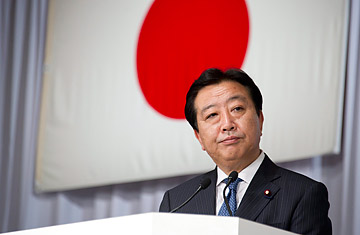
Japanese Finance Minister Yoshihiko Noda listens to a question from the press after winning the Democratic Party of Japan (DPJ) presidential election in Tokyo, Japan, August 29, 2011.
(2 of 2)
In his victory speech Noda said, "If the Democratic Party falls apart, old politics will prevail. Let's all persevere and work hard for the good of the people, and achieve political stability."
The lack of cooperation between the DPJ and opposition parties has been the major stumbling block in getting vital bills passed in Parliament. Noda has been a proponent of a grand coalition, working with the main opposition Liberal Democratic Party (LDP). But the LDP shows no sign of wanting to cooperate. "Their strategy has been to discredit the ruling party and the prime minister by provoking legislative gridlock," says Kingston. "Cooperation would mean getting things done and that would not necessarily help the LDP."
During a post-election news conference, Noda said, "I hope to build trusting relations with the opposition parties to hold policy negotiations and ask for their cooperation. Japan can't afford a political vacuum or dissolution of the lower House. Everyone has to work together..."
But even Noda's position on the grand coalition proposal has been wavering. "[He] started toning down his intention to team up with other parties," says Yamamoto. "The biggest change [Noda] could bring is to put substance to the currently hollow phrase seiji shudo or 'policy led by politicians rather than bureaucrats.'"
Beyond domestic bickering, another challenge for Noda will be foreign policy; getting bilateral relations back on track with both China and the U.S. But Noda's policy position again appears vague. Japanese war crimes in China during World War II have not been forgotten and the issue has been the source of diplomatic flare ups. In addition, tensions between China and Japan spiked in September last year when a Chinese fishing boat collided with Japanese Coast Guard boats near the disputed Senkaku islands (which Beijing calls the Daiyu Islands). Chinese boats continue to enter the disputed waters. Noda's visits to Yasukuni Shrine may also be considered a provocative issue. The Shinto shrine is considered by some as a symbol of Japanese domination in Asia during World War II. "Noda is one of the few DPJ members to visit Yasukuni Shrine which could be criticized by China," says Toshikawa. On the American side, the U.S. military airbase in Okinawa has been a bone of contention with Japanese locals on the southern island who want to see it moved. "But Noda feels strongly about maintaining close ties with the U.S.," Toshikawa adds.
Public opinion shows growing cynicism towards the revolving door nature of Japanese politics and the country's prime ministers. "I'm not sure Noda is going to be able to restore and rebuild the government, and be able to restore popular faith in politicians. It's going to seem more of the 'same old.'" says Kingston. "People really long for the days of a bold leader like Junichiro Koizumi [LDP prime minister from 2001 to 2006] with a vision of hope who would say, 'Yes, we're all facing difficulties now but if you follow me — no pain, no gain — things will be better.'"
